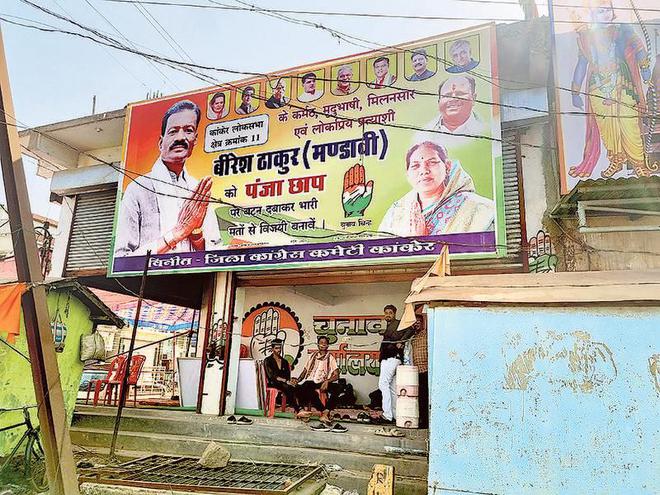In the backdrop of an ongoing Lok Sabha campaign in Kanker constituency, that votes on April 26, the deadliest anti-Naxal operation in Chhattisgarh’s history was carried out in the fringes of the district, with as many as 29 Naxalites killed on April 16.
While this has triggered a political war between the main players, with the Bharatiya Janata Party accusing the Congress party of supporting Naxals, it is yet to become a talking point on the ground. Two days after the operation in Chhotebethiya area on the fringes of the Kanker district, the candidates are not too vocal about it in their campaign speeches.
Residents like Baliram Usendi, 54, a school teacher based in Antagarh, also suggest that the recent anti-Naxal operation may have emerged as a larger theme, but locally it is less likely to dominate the polls as Naxal violence has been a long-standing issue.
Mr. Usendi says that if violence subsides completely, it will help those impacted by it, especially far flung areas. He hopes for a resolution of the ongoing conflict, adding that peace should also give way to infrastructural development, a pressing need. “We do not have good roads to the interior villages due to which many young tribal students are unable to access the schools or job opportunities,” he says.
His views on the infrastructure issues are visible in Kalpar, Binagunda, and Koronar, villages close to the site of the recent gun battle between security forces and Maoists. Here no roads, Aanganwadis or health centres exist but many villagers are not even aware of the elections, some don’t even know the name of the village sarpanch.
In another part of the constituency lies Koilebeda, a large Panchayat in Pakhanjur Tehsil of Kanker. While the village itself has decent infrastructure, it is also a centre where those from hamlets on the other side of the river come to access basic facilities.
Basanta Patel, a resident of one such village, Gandadi, says covering the distance of one kilometre between her village and Koilebeda is a herculean task in the monsoon months when they have to use tubes to reach the area. A bridge has been a long standing demand but does not see it getting fulfilled anytime soon. The campaign has not reached her village yet but she has heard of Bhojraj Nag, the BJP candidate for the area in her interaction with fellow residents.

Among the candidates, the BJP has dropped its sitting MP Mohan Mandavi to field former MLA Bhojraj Nag. The BJP’s campaign, however, is visibly dependent on what its leaders describe as Prime Minister Narendra Modi’s “charisma”. B.S. Khaparde, a BJP worker from Bhanupratappur, says that they seek votes in the name of Mr. Modi, as they had done in the Assembly election and hope to get a similar result.
Be it the BJP’s campaign material or Mr. Nag himself handling media questions surrounding his candidature or the contest itself, the view that it is really a referendum on PM Modi resonates everywhere. “There is no [Congress candidate Biresh] Thakur or no candidate in front of Modiji’s Tsunami. There is only the lotus flower and Modiji’s guarantee,” Mr. Nag says.
Unlike Mr. Nag, the Congress candidate Biresh Thakur is banking more on his personal clout and outreach work in the constituency. He is the only candidate who contested the 2019 election, albeit unsuccessfully, on a Congress ticket.
The 55-year-old Mr. Thakur is from the Gond tribe and hails from a family that has several members working in the police, including in senior positions. His ancestors were landlords of his native village in Bhanupratappur and hence use the moniker Thakur. In his campaign posters, however, he has been mentioned as Biresh Thakur (Mandavi), carrying his native family name, which, his supporters say is to avoid confusion among the Gonds.
Mr. Nag is known for his controversial statements and “anti-conversion” work among the tribals. Both the Congress and BJP workers feel that the BJP has a better grip in the urban pockets like Kanker City, even among the tribals who have shifted there. Vikram Kumar Netam, a 32-year-old who runs a medical store is a self-proclaimed BJP supporter and says the conversations around the reservations and Uniform Civil Code do not bother him.
Kanker, a Lok Sabha constituency reserved for tribals, is spread across Kanker and Balod districts of Chhattisgarh. Like roads, expansion of railways have been a long-standing demand, while education and employment opportunities are crucial, opine residents.
Brahmaiya Rao, a retired Bhilai Steel Plant employee from the mining town of Dalli Rajhara in Balod district, says for those like him the threat of their areas becoming ghost towns was the primary electoral issue.
“The mine deposits are shrinking and consequently the population. There was a time when one lakh people lived in Rajhara and now it is down to 35,000. There are no opportunities for the youth and they are forced to set up businesses elsewhere,” Mr. Rao, who was in Bhanupratappur to attend the inauguration of a medical shop set up by the son of one of his former colleagues, says.



.png?w=600)



